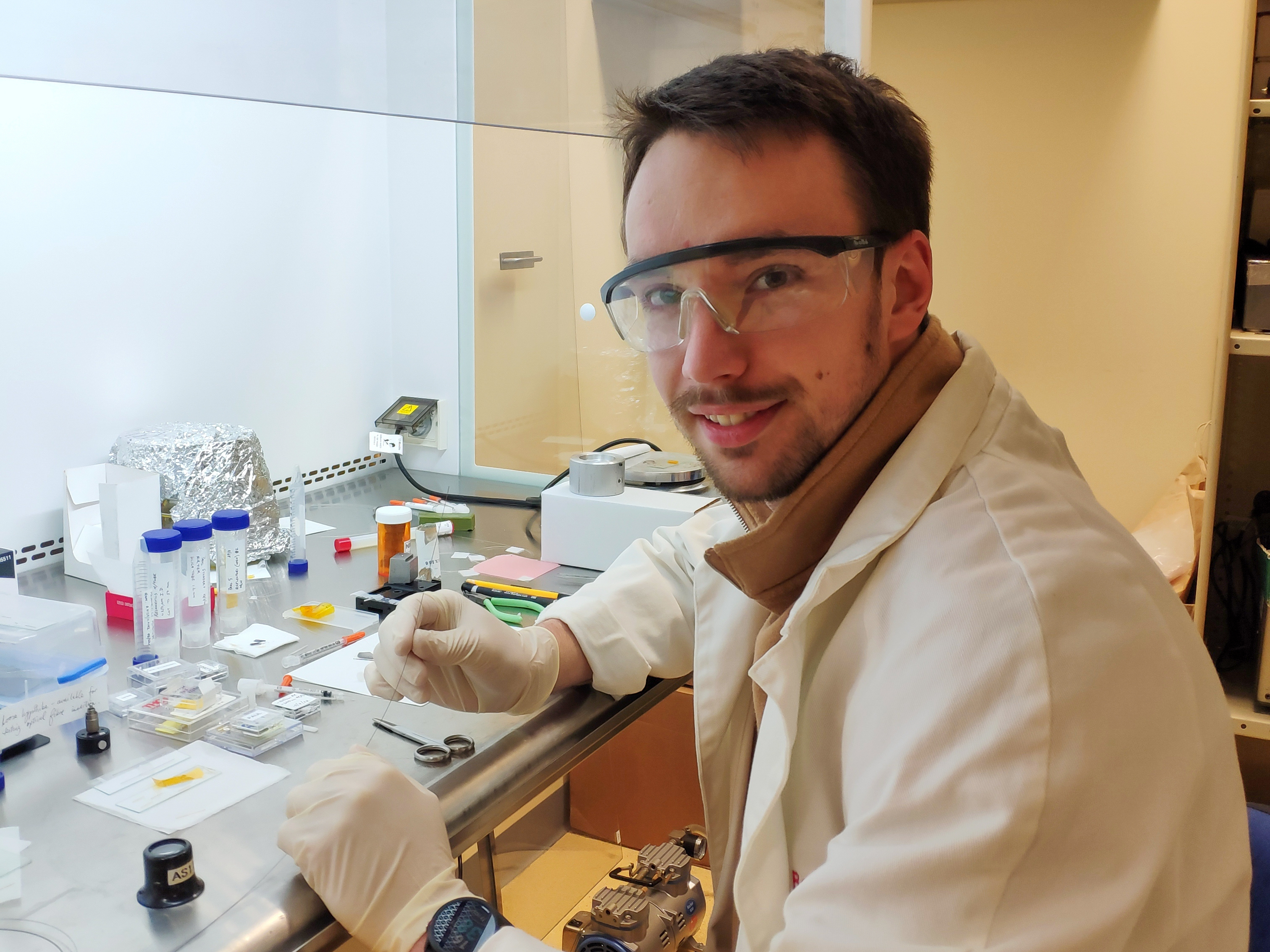Internship at the heart of groundbreaking coronary tech

PhD student, Toon Goris, during his internship with Nirtek
In summary
- Swinburne PhD student, Toon Goris, was offered an internship with leading-edge coronary technology start up, Nirtek
- Nirtek is developing a device that can be fed into the coronary arteries to evaluate the risk of heart attack and help saves lives
- Toon’s research flowed directly into the industry project and was integral to progressing the device to its current prototype
It is estimated that 17.9 million lives are lost to heart attacks each year. This makes heart failure the number one cause of death globally. The major cause of heart attack is unstable fatty deposits, called plaque, in the walls of the arteries. Current procedures can detect the presence and the degree of plaques, but they cannot determine if plaque is stable or unstable.
Swinburne PhD intern, Toon Goris, is working with ground-breaking medical device startup, Nirtek, to change that. Nirtek is developing a device that can be fed into a coronary artery to detect which plaques are unstable by using near infrared light.
Connecting industry and research
Nirtek Research and Development Program Manager Carla Zampaglione worked closely with Swinburne PhD supervisor, Professor Paul Stoddart, to help fill a gap in their team with Toon’s specialised skills.
“Paul spoke highly not only of Toon’s capability, but also the alignment of his unique skillset and the needs of our project,” says Carla.
Toon jumped at the idea of being able to develop his knowledge in an industry setting.
"The research Nirtek was doing was very close to my field, and I could directly translate my academic work," he explains.
Making a real contribution
With the support of the inclusive Nirtek team, Toon soon found himself becoming the 'go-to guy' for his area.
“In the industry setting I have enough knowledge to help. It feels like I can really contribute,” he says.
Toon created a testbed comprised of phantom tissues – complex artificial gels that mimic human tissue – for Nirtek to trial their device. This process was integral to advancing the design to its current prototype.
“My work with Nirtek has impact; everything I have done has shifted the design straight away,“ says Toon.
“Toon has been instrumental in helping Nirtek bridge the gap between evaluating theoretical research and actual real-life use cases of our cardiology diagnostics guidewire device, which assists in the prevention of heart attacks,” explains Carla.

Nirtek’s guidewire device concept uses near infrared light inside an artery to see if plaques are unstable
Beyond the science
As well as expanding his scientific knowledge and experience, working as part of a diverse team taught Toon to report confidently, communicate research in a way that is accessible, and not to be afraid to ask questions.
“My internship helped me in my teamwork skills, as well as my academic knowledge,” says Toon.
“It taught me that it's okay to say: I don't know this, but I'll figure it out by next week.“
“Toon brings a fantastic attitude and approach to learning to the Nirtek team,” says Carla.
“He has interacted with highly experienced technical personnel, the management team and the leadership team with the same upbeat, honest and enthusiastic manner.”
Work with impact
By the time Toon’s initial four-month placement was complete, he had become an integral part of the close-knit Nirtek team. They extended his contract, and he continues to work with Nirtek to fulfil the company’s vision of preventing heart attacks and saving lives.
The internship is hosted by Swinburne’s Medical Technology Victoria (MedTechVic) research hub as part of a larger partnership with Nirtek. This collaboration is focused on putting Victoria at the forefront of medical technology development and manufacturing, and seeding deep ties between research and industry.
-
Media Enquiries
Related articles
-

- Technology
- Science
- Engineering
Victorian students drive green energy transition through international hydrogen competition
Swinburne’s KIOSC, in collaboration with Horizon Educational and Gippsland Tech School, co-hosted the Hydrogen Grand Prix in Melbourne.Friday 26 July 2024 -

- Technology
- Health
New MedTechVic prototypes to transform everyday lives of people with a disability
Swinburne’s MedTechVic has revealed three new prototypes designed through the joint Health-led Manufacturing Innovation Program, in partnership with the Australian Medtech Manufacturing Centre and Safer Care Victoria
Friday 19 July 2024 -

- Business
- Technology
Swinburne’s Luminate Pitch Night 2024 advances innovative ideas for a better world
Swinburne’s 2024 Luminate Pitch Night showcased market-ready ideas from 10 founders
Wednesday 12 June 2024 -

- Health
- Education
Dissociation is a common trauma response among many who seek therapy, but only one in five psychologists can accurately identify symptoms
New Swinburne research has found that four in five Australian psychologists have gaps in their knowledge on dissociation and cannot accurately identify dissociation symptoms.
Friday 21 June 2024 -

- Health
- Technology
Clinical Innovation Fellowships develop creative solutions to Australia’s healthcare challenges
MedTechVic is gearing up to begin its fourth year of the Clinical Innovation Fellowship Program (CIFP), following the highly successful third round in 2023.
Wednesday 19 June 2024

